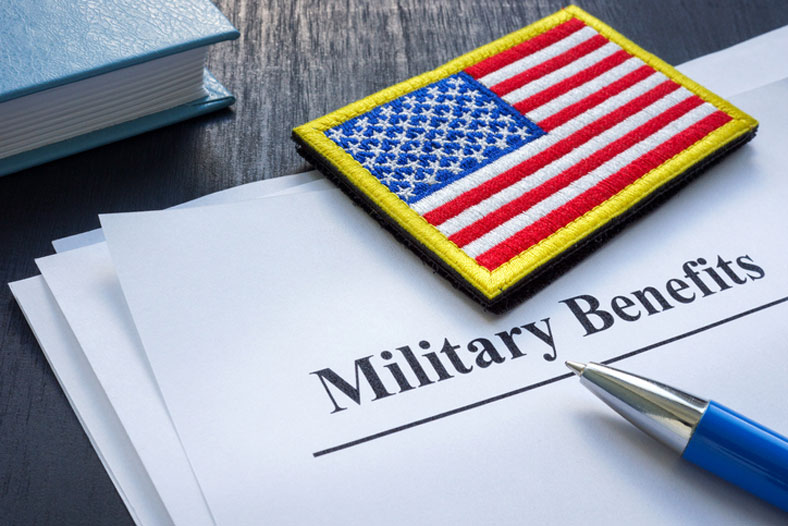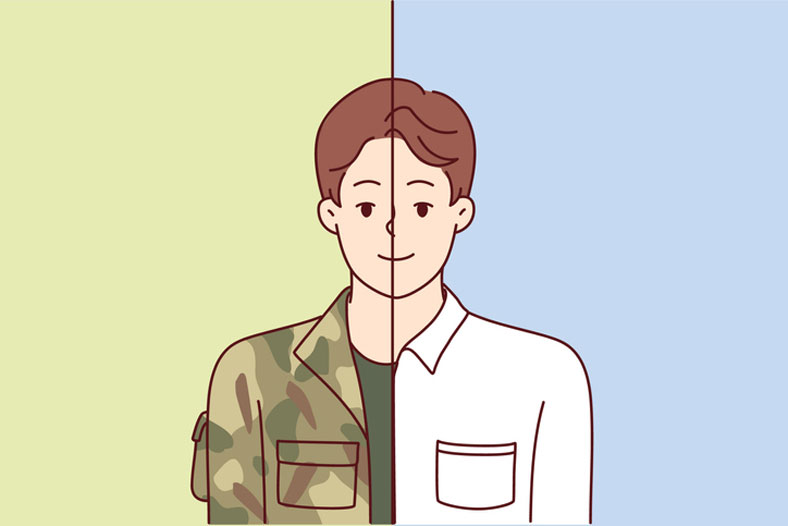Written by Sam Medley

Sometimes, it’s hard putting an experience into words. Maybe you had to be there. Maybe it would take too long to tell the whole story. Or maybe it’s just simply too dark to share. You tell yourself to clam up, grit your teeth, and move on. Many veterans transitioning back to civilian life have this inner dialogue every day — even at the cost of their physical and mental health.
That’s why social workers with military experience are so important to the field. They don’t just empathize. They understand.
Featured Programs:Sponsored School(s)
They understand the frustrations of jumping through limitless hoops just to get help. They understand why people build walls and become disillusioned. Whether veteran social workers are serving other veterans or the general public, this understanding is key to building trust and getting people the help they really need.
Earning a bachelors in social work (BSW) or Masters in Social Work (MSW) can help you turn that unique perspective into a set of impactful skills. And if you’re a veteran, you’ve earned a lot of benefits to help you on that journey. From tuition assistance programs and scholarships to organizations that can help you get ready for college, here are some resources to help you get the most out of your degree in social work.
General Resources for Veteran Social Work Students
The US Department of Veterans Affairs (VA)
Many of the financial resources you can use to fund your social work education are available through the VA. You may also qualify for VA loans, housing stipends, reduced insurance rates, and other benefits that make an MSW more attainable. And with over 17,000 social workers with MSWs employed in its offices, the VA is one of the nation’s top social worker employers.
The California Department of Veteran Affairs (CalVet)
If you need assistance applying for, understanding, or accessing your educational benefits, CalVet is a great place to start. They have offices in most counties, run a number of programs aimed at helping veteran college students, and offer a wide selection of online services.
California Department of Social Services (CDSS)
The CDSS is made up of 58 county social service agencies. Each agency is responsible for providing services like child welfare, housing assistance, and mental health counseling in their local area. Veterans who apply to government social service positions can get preference over other candidates.
Council on Social Work Education (CSWE)
The CSWE is responsible for ensuring bachelor’s and Master’s of Social Work programs across the country prepare students for careers in the field. Many social service agencies prefer job applicants with degrees from CSWE-accredited schools, especially for higher-level roles. To become a Licensed Clinical Social Worker (LCSW) in California, you must have an MSW from CSWE-accredited school.
Explore CSWE-accredited MSW programs in California.
The California Chapter of the National Association of Social Workers (NASW)
As the biggest professional organization of social workers in the nation, the NASW is influential in crafting social service policies, establishing ethical guidelines, and keeping the workforce up to date. Through the California Chapter, you can get involved with local advocacy efforts and find unique certification and continuing education opportunities.
Federal Military Education Benefits

Post-9/11 GI Bill (Chapter 33)
The Post-9/11 GI Bill can cover tuition and fees along with expenses associated with housing, moving, books, and school supplies. These funds can be used to pay for a BSW, MSW, job training programs, and may even cover some costs associated with the California Licensed Clinical Social Work exam. Many veterans who pursue higher education choose the Post-9/11 Bill for its flexibility and because if you’ve served 90 days, you can use it while on active duty.
To be eligible, you must have served at least 90 days on active duty on or after September 11, 2001, received a Purple Heart and were honorably discharged, or served at least 30 continuous days on active duty before being honorably discharged due to a service-related disability.
Montgomery GI Bill- Active Duty (MGIB-AD)
Montgomery GI Bill benefits cover many of the same costs as Post-9/11 benefits, but can only typically be used for a maximum of 36 months. On top of that, they typically expire 10 years after an honorable discharge or separation.
The VA lists four ways a veteran can qualify for these benefits. Most requirements depend on length of service, what years you served, and how much your military pay was reduced during service. Applicants must typically have a high school diploma, GED, or twelve college credit hours.
Montgomery GI Selected Reserve (MGIB-SR)
The MGIB-SR program provides a maximum of 36 months of educational and job training aid to members of the Air Force, Army, Coast Guard, Marine Corps, and Navy Reserves as well as members of the Air and Army National Guards. MGIB-SR benefits typically last for about 36 months.
To qualify, you must agree to serve at least six years in the Selected Reserve or you must be an officer who has agreed to serve an additional six years. You must also remain in good standing, finish your initial active duty for training, and earn a high school diploma, GED, or similar certificate.
Which GI Bill Program Is Right for Me?
GI Bill benefits are typically paid on a monthly basis. But how much aid you get each month is calculated based on factors like length of service, how many semesters and classes you’re taking, and tuition averages for in-state students. For many veterans, it makes more sense to use the Post-9/11 Bill than the MGIB. For others, it’s the opposite.
To help you decide, the VA has an online GI Bill Comparison Tool that lets you search for schools by name or location. After choosing a few schools and GI Bill options to compare, the tool estimates how much aid you might receive per term and for tuition and fees, books, and housing. VA, CalVet, and school representatives may also be able to help you choose an option that maximizes your benefits.
State and School-based Financial Aid Programs for Veterans
Yellow Ribbon Programs
The GI Bill may not cover all of your educational expenses. This is especially true if you enroll in a private or out-of-state institution. To cover this gap, some schools partner with the VA through the Yellow Ribbon Program.

Yellow Ribbon schools agree to waive a portion of veteran students’ expenses. The VA then matches that waiver. For example, if a Yellow Ribbon school waives $5,000 of a veteran’s expenses, the VA will put another $5,000 towards that student’s expenses. This, combined with GI Bill benefits, can make a private education much more budget-friendly. In some cases, it may cover all expenses.
Fortunately, California is home to many CSWE-accredited Yellow Ribbon schools that offer bachelor’s and/or Master’s degrees in Social Work:
- Azusa Pacific University
- California Baptist University
- Fresno Pacific University
- La Sierra University
- National University
- Pacific Union College
- Point Loma Nazarene University
- Touro University Worldwide
- University of California at Berkeley
- University of Massachusetts Global
- University of the Pacific
- University of Southern California
- Whittier College
The CA Community Colleges (CCC) Program
This program allows many of California’s veterans to attend California Community Colleges (CCC), California State Universities (CSU), and Universities of California (UC) at little to no expense. Many of these campuses also have Veteran Resource Centers and give veterans priority registration access.
Non-resident College Fee Waiver
Out-of-state students attending CCC, CSU, and schools in the UC system typically have to pay more tuition fees than California residents. The Non-resident College Fee Waiver program allows some veterans to avoid these costs meaning your GI Bill benefits may cover more of your social work education. To qualify, you must have been stationed on active duty in California for more than a year before discharge.
California National Guard Education Assistance Award Program
Members of the State Military Reserve (SMR) and the California National Guard (CNG) can qualify for up to 100% tuition assistance at CCC, CSU, and UC schools. Amongst other requirements, applicants must be an active member of the SMR or CNG, have served at least two years, enroll in at least three academic units every term, and maintain an annual 2.0 GPA.
Branch-specific Education Funding Programs
Army Education Assistance Programs
Active duty, reserve, and National Guard soldiers can apply for up to $4,000 in tuition assistance per year. But that’s not the only program open to members of the US Army. The Green to Gold program helps soldiers pay for four-year bachelor’s or two-year graduate degrees while other programs cover costs for professional certifications and help personnel repay student loans.
The Air Force Military Tuition Assistance (MilTA) Program
The US Air Force offers up to 100% tuition assistance for bachelor’s and graduate degrees. If you’re pursuing an MSW, you must maintain a GPA of 3.0. Members of the Air Force Reserve are also eligible for this program.
The Coast Guard Tuition Assistance (TA) Program
Coast Guard personnel can receive up to $4,500 per year in tuition assistance. Active duty service members are eligible for this program, but the TA program also extends to members of the Selected Reserve and civilians in the Coast Guard workforce.
Marine Corps Educational Assistance Programs
Like the Coast Guard and Air Force, the Marine Corps offers up to 100% tuition assistance for active duty service members. Through the Advanced Degree Program (ADP), Marines with bachelor’s degrees can apply for aid to pursue a Master’s. Marines in ADP get their regular pay while attending classes full time.
Navy Tuition Assistance Program
The Navy will pay up to $250 per credit hour for up to 120 hours total. Funding extends to classroom instruction, online learning, some professional certificates, and continuing education courses.
California Military Department GI Bill Award Program
Members of the California Army or Air National Guard, Naval Militia, or State Guard can attend many of the state’s public universities and community colleges for free. Students enrolled at some private institutions in California are also eligible to receive aid.
Scholarships, Grants, and Other Funding Opportunities
Vet Center Scholarship for Mental Health Professionals
The VA offers scholarships to aspiring social workers, psychologists, Licensed Professional Mental Health Counselors, and Marriage and Family Therapists. This scholarship covers two years of graduate education. To be eligible, you must pledge to work for six years at one of the 300 Vet Centers across the country. Currently, there are about 30 VA Vet Centers in California.
The Tillman Scholar Program
Each year, the Pat Tillman Foundation awards scholarships of about $10,000 each to about 60 veterans and active duty service members. These scholarships can be used to fund undergraduate or graduate degrees. Applicants must submit a resume, two 400-word essays, and a character recommendation.
AMVETS
Formed by World War II veterans in 1944, AMVETS offers multiple scholarships to help veterans pay for expenses not covered by GI Bill benefits. Scholarships range from about $4,000 to $12,000 and are open to veterans, active duty service members, and members of the National Guard and Reserves.
College, Career, and Transition Readiness Programs

Veteran Readiness and Employment (VR&E)
The VA offers multiple career readiness and transitional services through the VR&E program. VetSuccess on Campus connects veterans to on-campus counselors and resources at colleges all across California. Other programs focus on applying transferable skills to civilian careers, helping disabled veterans find training and jobs, and guiding service members through using their benefits.
The California Association of Veterans Service Agencies (CAVSA)
Headquartered in Sacramento, CAVSA is a partnership between six veteran-focused organizations across California. Their employment and training program is focused on serving veterans who have found the transition to civilian life difficult.
Troops to College
This program, hosted by California State University, prepares veterans to succeed in the classroom. A combat veteran VA counselor teaches classes about topics like managing combat-related stress, adjusting to college social life, and how to succeed academically.
Centers of Excellence for Veteran Student Success (CEVSS)
The US Department of Education gives grants to colleges and universities so they can dedicate resources to improving the student veteran experience. Institutions that receive CEVSS funding are required to establish support teams responsible for helping veterans with admissions, financial aid, academic advising, and other areas of the college experience. Many California State Universities and California Community Colleges participate in this program.
Wounded Warrior Project
The Wounded Warrior Project is one of the biggest veteran advocacy and nonprofit service organizations in the country. They foster relationships between veterans from all branches, offer financial education courses, run mental health programs, and collaborate with other agencies to ensure veterans have support outside of the government benefits system.



